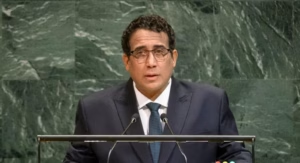Any action taken by China in regards to energy and climate change is indeed considered significant on a global scale. This is due to the substantial impact their policies have on fossil fuel demand and the worldwide effects of global warming. On Thursday, the world was informed that China, under the leadership of President Xi Jinping, set a new goal – to reduce its greenhouse gas emissions in absolute terms for the first time. During a video address to the United Nations, Xi announced that China’s emissions would decrease by 7% to 10% from their peak. Although the timing of the peak was not specified, some analysts believe it may have already occurred.
Anthony Albanese, the Prime Minister of Australia, responded to Xi’s announcement with a statement saying it was “good” to see progress being made, but added that Australia would “like to see more”. China’s emissions account for about 29% of the global total, more than double that of the United States, the world’s second-largest emitter. As Dr. Wesley Morgan, a climate expert, noted, seeing emissions peak and fall in China would likely lead to a similar trend worldwide.
Becoming increasingly relevant for Australia was the release of the country’s first national climate risk assessment. This laid out the potential economic, community, and wildlife impacts as global temperatures continue to rise. For those advocating for slower emissions reductions in Australia, citing China’s previous lack of a target, this new development may make such arguments harder to maintain.
Although China’s new target does not align with the goal to limit global heating to 1.5°C, the majority of other national 2035 targets (including Australia’s) are also not in line with this goal. Experts have expressed disappointment with what they considered to be the modest nature of China’s target. However, others pointed out that China had a history of underpromising and then overdelivering on their previous targets. China is a significant manufacturer and deployer of technologies aimed at slowing global heating, such as wind turbines, solar panels, electric vehicles, and batteries. Additionally, President Xi set other goals for 2035, including increasing solar and wind capacity by six times the levels in 2020, and raising the share of non-fossil fuels providing the country’s energy to over 30%.
Experts believe that both of these targets will be easily met. China has been adding between 300GW and 400GW of solar and wind energy annually for the past two years. Furthermore, any ambition from China to cut its fossil fuel use will be closely monitored by the fossil fuel industry. China is the world’s largest importer of both steel-making coal and coal for burning in power stations, as well as a significant importer of LNG.
Josh Runciman, an Australian gas analyst, stated that falling fossil gas demand from China will affect China’s LNG demand, and consequently, Australian coal exports. While China is still constructing coal-fired power plants, there was a cut in coal power consumption of about 100 terrawatt hours in the first half of 2025. For context, that reduction is roughly the equivalent of turning off all the coal plants in Australia’s national electricity market for 11 months.
China has installed around three-quarters of all solar and wind power on the planet, meaning they are doing three times more than the rest of the world combined. Bill Hare, the founder of research organization Climate Analytics, believes that China can meet its new target through policies that are already implemented, so it may not lead to a reduction in emissions.
Despite being a major supplier of fossil fuels to China, the Australian government continues to openly support the export of these fuels to China. However, this could be more beneficial for all parties if Australia facilitated a rapid shift away from these fuels in China, instead of favoring ongoing exports.
Source: https://www.theguardian.com/australia-news/2025/sep/26/china-first-emissions-reduction-target-announced-global-impact








